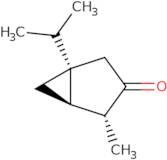±-Thujone
CAS: 546-80-5
Rif. 3D-AAA54680
| 1g | Fuori produzione | ||
| 50mg | Fuori produzione | ||
| 100mg | Fuori produzione | ||
| 250mg | Fuori produzione | ||
| 500mg | Fuori produzione |
Informazioni sul prodotto
- ()-alpha-Thujone
- (-)-Thujone
- (-)-α-Thujone
- (1S,4R,5R)-1-Isopropyl-4-methylbicyclo[3.1.0]hexan-3-one
- (1S,4R,5R)-4-Methyl-1-(1-methylethyl)bicyclo[3.1.0]hexan-3-one
- 1-Isopropil-4-Metilbiciclo[3.1.0]Hexan-3-Ona
- 1-Isopropyl-4-Methylbicyclo(3.1.0)Hexan-3-One
- 1-Isopropyl-4-Methylbicyclo[3.1.0]Hexane-3-One
- 1-Isopropyl-4-Methylbicylco [3.1.0] Hexan-3-One
- 1-Isopropyl-4-methylbicyclo[3.1.0]hexan-3-on
- Vedi altri sinonimi
- 3-Thujanone, (1S,4R,5R)-(-)-
- Absinthol
- BICYCLO[3.1.0]HEXAN-3-ONE, 4-METHYL-1-(1- METHYLETHYL)-, [1S-(1α,4α,5α)]-
- Bicyclo[3.1.0]hexan-3-one, 4-methyl-1-(1-methylethyl)-, (1S,4R,5R)-
- Nsc 93742
- Thujon
Thujone is a naturally occurring organic compound that is found in small quantities in various plants, including the common wormwood plant. It has been shown to bind to GABA receptors and induce cell death, which may be due to its ability to inhibit the synthesis of gamma-aminobutyric acid (GABA). Thujone can also suppress inflammation by inhibiting the production of cytokines such as tumor necrosis factor-α (TNF-α) and interleukin-1β (IL-1β). Thujone has been found to be cytotoxic and affect receptor binding in human liver cells, as well as cause significant cytotoxicity in human serum. This effect is greater when thujone binds with deuterium isotopes. The activity of thujone on receptors has been shown using a solid phase microextraction technique on human liver tissue. Thujone also has an effect on GABA receptors, which can lead to inflammatory diseases.





